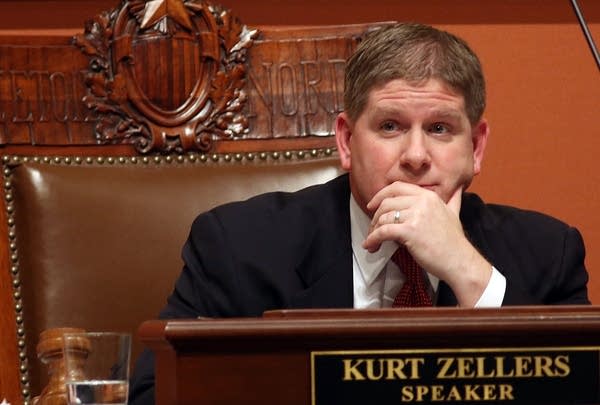Minnesota Vikings one step closer to new stadium
Go Deeper.
Create an account or log in to save stories.
Like this?
Thanks for liking this story! We have added it to a list of your favorite stories.

Only a state Senate vote, the governor's signature and approval from the Minneapolis City Council stands between the Vikings and a $975 million stadium that could be ready for the 2016 season.
After a conference committee worked out a deal for a final version of the bill, the House passed the stadium plan early Thursday by a 71-60 vote. The Senate is expected to take up the measure Thursday morning.
Despite the team owners' long insistence that they wouldn't give any more financial ground on the stadium deal, they agreed to increase their contribution by $50 million, minutes before the Legislature was to take up the deal.
"The Wilfs and the Vikings are stepping up for $477 million, and $13 million a year," said Vikings Vice President Lester Bagley. "It is a heavy lift. But it's the right thing to do for Minnesota."
Turn Up Your Support
MPR News helps you turn down the noise and build shared understanding. Turn up your support for this public resource and keep trusted journalism accessible to all.
That increased the team's contribution from about 44 percent to 49 percent of the $975 million project. The concession cleared the way for the House to sign off on the deal, which it did early Thursday morning. (See the roll call here.)
The Vikings intend to take advantage of an NFL loan program, sell naming rights and possibly impose seat license fees to help cover the team's end of construction costs.

Under the deal, the state's share is $348 million, down by $50 million from the original deal struck by the Dayton administration in March. The state's share will be paid mostly by new, electronic pull tabs and bingo.
The original House version, which was approved earlier in the week, had called on the Vikings to pay an additional $105 million, and would have given the state a portion of the stadium naming rights.
Not everyone was convinced that the last-minute change had improved the deal. Rep. Tina Liebling, DFL-Rochester, was among the no votes.
"I'm not a person who says we shouldn't build any stadium. But I think the state got rolled. Our constituents got rolled," she said.

But Rep. Jim Abeler, R-Anoka, said the Vikings' reluctance to pay the extra money was an indication that the state had done the best it could, while keeping the team from leaving Minnesota.
"Fifty million dollars on that was above their top dollar, and I'm inclined to believe we did really well on getting that price out of them," said Abeler.
Supporters of the deal said there were other improvements, as well.
Metropolitan Sports Facilities Commission chairman Ted Mondale said the bill protects the state and city from cost overruns on the project.
"The way we have it looking today, it's an $822 million building. There will be a public bid out not to exceed $822 million. So there is no risk to the taxpayer on cost overruns on the construction of the building," Mondale said.

Mondale said there would be a similar deal for ongoing operations at the stadium.
He told lawmakers the state intended to hire a management firm to run the facility for a fixed price, and that the company would have to assume the risk for unforeseen costs after the facility opens.
The final bill drops some unrelated provisions, including an "Amazon tax," which would have charged sales taxes on Internet purchases by Minnesotans. Tax increment financing necessary for a proposed Mall of America expansion is out, as well.
The deal also gives back to the Vikings exclusive rights to bring a major league soccer franchise to Minnesota -- although the team will have to pay market rate rent to play in the new stadium. The Senate had dropped soccer from a previous version.
If a soccer team were to use the new stadium, the Vikings would have the option to upgrade the roof to a retractable version at their expense, at an expected cost of $40 million.
If the Senate approves the deal, it goes to Gov. Dayton for his signature. Dayton has been one of the strongest advocates for the project.
Once he signs, the Minneapolis City Council would have 30 days to ratify the tax shift that pays for the city's share of the Vikings stadium.
If all those steps are approved, initial utility work could start this summer, and construction next year. The stadium could open in 2016.





